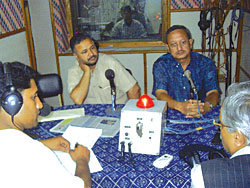 It all began three years ago when a fresh science graduate from Lubhu, tired of teaching school, decided to make a career move. He walked into Radio Sagarmatha, Nepal's first public service broadcaster, and offered himself as a volunteer. There followed nine months of long unpaid hours, and gruelling in-house training, and lo and behold: Kathmandu got one of its most incisive and hard-hitting radio discussion programmes.
It all began three years ago when a fresh science graduate from Lubhu, tired of teaching school, decided to make a career move. He walked into Radio Sagarmatha, Nepal's first public service broadcaster, and offered himself as a volunteer. There followed nine months of long unpaid hours, and gruelling in-house training, and lo and behold: Kathmandu got one of its most incisive and hard-hitting radio discussion programmes. Kiran Pokhrel hosts Radio Sagarmatha's best known prime time radio talk programme Aja ka Kura (Today's Talk). He has talked day-in, day-out, seven days a week about everything under the Nepali sun: the dissolution of parliament, life without local governments, mismanagement of hospitals, vehicle emission standards, the martial rape bill, duped Nepali migrant workers, you name it.

It's now come to the point where you're nobody unless you have been grilled by Kiran on Aja ka Kura. A list of his interviewees is a who's who of Nepali politics: former prime ministers Surya Bahadur Thapa and Lokendra Bahadur Chand, UML boss Madhav Kumar Nepal and dozens of his comrades, hundreds of activists, students, all have been heard. Everyone gets a chance to take pot shots at everyone else, and it doesn't matter if you are a senior minister or a migrant worker: you get equal time.
Kiran is completely and passionately submerged in the world of radio, and he says it doesn't matter that salaries in community radio are not very high. "It is the satisfaction of doing it right, money can't buy you that. And the gratification is knowing that the issues we broadcast influence policy decisions."
Kiran saw how powerful his medium was when lawyers played a recording of his Q&A on a government decision to allow Indian vehicles into Nepal on self-certification to the judge who then ruled against it. A programme highlighting an Indian minister's statement on placing Indian security at Kathmandu airport after the 1999 hijacking became controversial and was picked up by the opposition MPs who raised a fuss in the house.
Last year, he and a colleague covered the pyramid savings scheme. Duped Nepalis jammed the switchboard at the station with calls, and the NGO involved was forced to refund the money.
At 26, Kiran is not planning too far ahead. He wants to fulfil his late father's wish that he get an MA degree before embarking on a career. Trouble is, Kiran's career has laready taken off, and he doesn't have much time to study.
We just had one last question. When are we going to see female Kirans in the male-dominated world of news and current affairs on radio? Answer: Radio Sagarmatha is grooming young women journalists, so it may not be long before we start hearing from radio gals, too.


